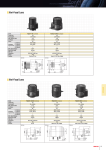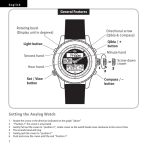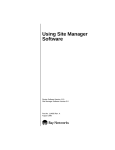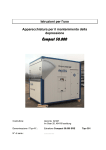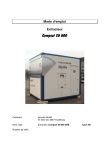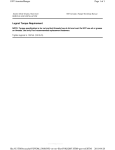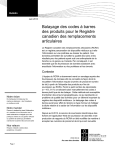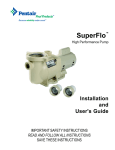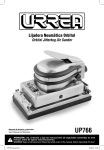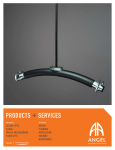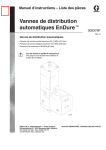Download AP0300 Travel Expense Policy User Guide
Transcript
This is an Interior Health CONTROLLED document. A copy of this document in paper form is not controlled and should be checked against the electronic file version to ensure accuracy Travel User Guide INTRODUCTION This User Guide is an extension of Interior Health Authority (IH) AP0300 Travel Expense Policy. It is designed to provide essential information for persons engaging in IH-approved travel, as well as those responsible for approving or reimbursing related Travel Expenses. Detailed procedures are outlined for obtaining authorization, incurring Travel Expenses, submitting claims and receiving reimbursement. As stated in AP0300, requirements for obtaining authorization, incurring expenses, and determining eligible expenses apply equally to expenses charged on a corporate credit card, direct-billed to IH, or paid by and reimbursed to the Eligible Individual. Definition of Eligible Individual (as defined in AP0300): All Interior Health employees, medical staff, or any other person authorized by Interior Health (including clients and contractors as necessary) to incur expense while conducting Interior Health business, but excludes Directors of the Board (who are covered by Board Policy 3.6 “Director Retainers, Fees and Expenses”) and contractors with specific provisions which vary from those contained in this policy (e.g. Cost Recoverable Contractors under Facilities Management Reimbursable Expense Guidelines or physicians covered by various IH Medical Staff Policies) The following principles will guide Eligible Individuals in business travel decisions: • taxpayer dollars are used prudently with the intention of delivering best value; • risk to any person or the environment is minimized; • environmental and sustainability factors are considered; • reimbursement processes are effective and efficient; and • Travel Expenses and information about Travel Expenses are publicly disclosed as required. Payment methods for Travel Expenses, in order of IH preference, are as follows: 1. Corporate Credit Card – This provides benefits such as additional insurance coverage and rebates for IH and should be used whenever possible. Additional responsibilities of corporate credit card holders are detailed in AQ0600 Corporate Credit Cards Code of Responsibility, including a prohibition against using corporate credit cards for personal expenses. 2. Direct Billing - Authorization for expenses billed directly to IH is governed by AP0700 Signing Authority. 3. Reimbursement to Eligible Individuals - When Travel Expenses cannot be charged to a corporate credit card or billed directly to IH, expenses incurred by an Eligible Individual must be submitted for reimbursement either through the Travel and Education Expense Reimbursement Request (TEER) form or i-Site (mileage only) as appropriate. Any questions regarding this guide can be sent to [email protected] April 2015 Page 1 of 18 This is an Interior Health CONTROLLED document. A copy of this document in paper form is not controlled and should be checked against the electronic file version to ensure accuracy TRAVEL USER GUIDE OUTLINE Travel Planning • 1.1 Obtaining approval to travel • 1.2 Travel advances • 1.3 Booking travel • 2.1 Determining eligibility of expenses • 2.2 Maintaining receipts and other documentation • 2.3 Automobile travel (corporate, rental, personal) • 2.4 Air, bus or train travel Incurring • 2.5 Meals Expenses • 2.6 Accommodations • 2.7 Out-of-country travel • 2.8 Mobile devices • 3.1 Choosing the right method • 3.2 Timelines for submission of claims Claiming • 3.3 Completing the form (Eligible Individual's responsibilities) Expenses • 3.4 Obtaining expense approval (Approver's responsibilities) Reimbursement April 2015 • 4.0 Processing reimbursements (Accounts Payable, Health Shared Services BC responsibilities) Page 2 of 18 This is an Interior Health CONTROLLED document. A copy of this document in paper form is not controlled and should be checked against the electronic file version to ensure accuracy 1. TRAVEL PLANNING 1.1 Obtaining Travel Approval a) As per AP0700 Signing Authority Policy, prior approval for travel must be obtained from the cost centre manager. In the absence of specific approval or a standing agreement with the appropriate signing authority, Travel Expense claims may be denied. b) Authorization for out-of-country travel must be provided by the Vice-President responsible for the relevant portfolio. c) Authorization for recruitment Travel Expenses must be obtained from the Recruiting Department within Human Resources. d) Authorization for educational opportunities must be documented on the Request for Educational Opportunity form and signed by the Eligible Individual’s manager and education lead. e) Expenses incurred by the Chief Executive Officer must be approved by the Board Chair. f) Expenses incurred three months to six months prior to the reimbursement request require Vice President approval. 1.2 Travel Advances a) When approved Travel Expenses cannot be charged to a corporate credit card or billed directly to IH, and an Eligible Individual expects their out-of-pocket Travel Expenses to exceed $500, they can request a Travel Advance by completing the top section of the TEER form and obtaining the appropriate approval. The approved form must be submitted to Accounts Payable – Health Shared Services BC (A/PHSSBC) at least 10 days in advance of travel and no more than 30 days in advance of travel. b) Travel advances must be approved using the travel limits set out in this guide and AP0700 Signing Authority. c) Eligible Individuals who travel regularly are encouraged to obtain a corporate credit card (see also AQ0600 Corporate Credit Card Code of Responsibility). d) Eligible Individuals who receive travel advances are required to submit TEER forms with detailed original receipts immediately after the function. All travel advances must be reconciled and unused portions returned to IH by personal cheque within 30 days of the conclusion of the travel. e) Any accounts not cleared within the specified timeframe will be subject to deduction from the Eligible Individual’s pay. 1.3 Booking Travel a) Eligible Individuals traveling on IH-approved business are responsible for booking their own travel. When planning travel, Eligible Individuals are encouraged to minimize expenses by: 1. using technology such as videoconference, or teleconference as a substitute for face-to-face meetings when possible; 2. taking into consideration the cost effectiveness of the travel (in terms of both time and expense); 3. using corporate vehicles where available; April 2015 Page 3 of 18 This is an Interior Health CONTROLLED document. A copy of this document in paper form is not controlled and should be checked against the electronic file version to ensure accuracy 4. using rental vehicles; and 5. coordinating travel arrangements and car-pooling when more than one person from the same area is travelling to the same destination (including sharing taxis at destination and shuttle buses from/to airport). b) The means of travel chosen needs to be operationally feasible, cost effective and consider travel methods that will mitigate the production of greenhouse gas emissions. c) Travel Expenses are to be charged on a corporate credit card whenever possible. d) There are limitations on reimbursable amounts so before booking any travel the Eligible Individual should be familiar with the appropriate sections of this guide. e) Any travel cost which combines business and personal elements must be allocated on an equitable basis between business and personal portions. It is the responsibility of the Eligible Individual to work out the allocation with the Approver, and to document the rationale supporting the fairness of the allocation. Personal travel in corporate vehicles is not permitted. Limitations applying to personal automobile mileage reimbursement are applicable for the business portion of combined travel. Submissions of best-rate, coach-fare, round-trip air travel quotes as evidence of cost of business portion must be dated the same date as the actual invoice for travel (i.e. if travel is (or could have been) booked several weeks in advance, submission of quote for next-day travel is not acceptable). f) Appropriate insurance coverage is the responsibility of the Eligible Individual. Additional information regarding insurance is provided in the following sections based on specific type of travel required. g) Travel loyalty points earned during business travel accrue to the benefit of the Eligible Individual. This applies to transportation, accommodation and meals. Principles regarding selection of least-cost options must not be compromised to acquire travel loyalty points. All Travel Expenses that can be charged on a corporate credit card or billed directly to IHA must be. Please refer to Canada Revenue Agency resources to understand personal tax implications of receiving loyalty points from employment-related business travel. h) When an Eligible Individual utilizes a discount or credit for travel that reduces the original cost, only the net expense shall be claimed. For clarity, the cash value of personal discounts, credits, gift certificates, etc. applied to IH Travel Expenses shall not be claimed for reimbursement (e.g. a personal flight travel credit cannot be reimbursed to an Eligible Individual if used for business travel purposes). This subsection is not applicable to rebates, credits or privileges provided to the Eligible Individual for using a personal credit card for which a fee has been paid, where the Eligible Individual does not have access to a corporate credit card. i) When booking your travel, be sure to always ask for the current corporate or BC Government rate. j) Additional guidance, including links to approved travel providers, can be found at the Travel page on the insideNet or within Appendix A of this Travel User Guide. April 2015 Page 4 of 18 This is an Interior Health CONTROLLED document. A copy of this document in paper form is not controlled and should be checked against the electronic file version to ensure accuracy 2. INCURRING EXPENSES Eligible Individuals shall ensure they are familiar with the policy AP0300 Travel Expense before incurring expenses for approved business travel. Expenses must first meet the requirements outlined in Section 1.0 of that policy. Specifically the expenses must be: • a prudent use of taxpayer dollars; • considerate of risk to persons and the environment; • necessary to support IH business and/or clinical operations; • relevant to the individual’s roles and responsibilities with IH; • incurred at a reasonable cost; • appropriately documented; and • properly authorized. 2.1 Determining Eligibility of Expenses a) Eligible Travel Expenses include, but are not limited to meals, accommodation, and transportation in accordance with this policy. Special limitations apply to each type of Travel Expense. The Eligible Individual is responsible to be aware of those limitations. Determination of eligibility is applicable regardless of the manner of payment (i.e. corporate credit card, direct billing or personal payment and reimbursement). b) Where an expense is not specifically listed, the Eligible Individual and Approver are to exercise sound judgment in determining eligibility. Following are examples of eligible expenses: 1. vehicle mileage when personally-owned vehicle used for travel (unless vehicle allowance is provided); 2. business-related parking costs at locations other than Eligible Individual’s principal work site(s); 3. rental vehicles; 4. fuel for rental vehicles; 5. reasonable cost of meals (see Appendix A for limitations); 6. accommodations (see Appendix A for limitations); 7. air fare, including taxes, basic baggage fees, and airport improvement fees; 8. taxi fare; 9. excess baggage charges, when extra equipment is required because of duties being performed; 10. highway tolls and ferry fees; 11. charges for electronic communication related to IH business; 12. charges for business-related phone calls; 13. one personal long distance call for each consecutive 24 hour period of absence; 14. laundry and dry cleaning expenses incurred after four(4) consecutive nights’ absence; 15. bus fares, including airport bus; April 2015 Page 5 of 18 This is an Interior Health CONTROLLED document. A copy of this document in paper form is not controlled and should be checked against the electronic file version to ensure accuracy 16. internet connectivity in hotel, airplanes or other public places; 17. the expenses of travel medical insurance purchased for travel outside of Canada (see also Section 2.7(d)); 18. travel immunizations; 19. expenses for a guest accompanying an Eligible Individual are reimbursable in accordance with this policy when the Eligible Individual is attending a function where a written invitation has been extended to include a guest, or when the guest is attending a pre-retirement or awards function for the Eligible Individual. Appropriate approvals must be obtained in advance; and 20. foreign medical expenses allowed under Section 3.3 of AP0300 Travel Expense policy. c) Examples of ineligible expenses include, but are not limited to: 1. interest charges on outstanding credit card balances; 2. entertainment videos and movie channels; 3. spa and fitness centre expenses; 4. traffic and parking fines; towing/impoundment fees (whether for corporate, rental or personally-owned vehicles); 5. alcoholic beverages (beverage charge, including proportionate tax and gratuity, must be deducted from any meal receipts); 6. in-room amenities not included in the cost of the room (e.g. mini bar); 7. loss of money or personal effects; 8. expenses resulting from failure to cancel transportation or hotel arrangements, except in extenuating circumstances; 9. voluntary additional days beyond the business purpose of the trip (excluding excursion flights requiring a Saturday overnight stay); 10. valet parking charges; 11. flight seat reservation/selection charges; 12. flight cancellation insurance in excess of amounts outlined in Section 2.4(c) of this guide; 13. expenses related to family or friends accompanying IH employees on business travel (except as set out in “eligible expenses” in Section 2.1(b) 20); 14. fuel for travel using personal vehicle (fuel is included in the kilometer rate used for reimbursement of Travel Expenses related to a personal vehicle); and 15. expenses not submitted within the time requirements set out in Section 3.2 of this guide. April 2015 Page 6 of 18 This is an Interior Health CONTROLLED document. A copy of this document in paper form is not controlled and should be checked against the electronic file version to ensure accuracy 2.2 Maintaining Receipts and Other Documentation a) Detailed original receipts (not credit card slips or statements) must be submitted with the TEER report and/or corporate credit card monthly submission, in support of all expenses claimed, unless specifically noted within this Travel User Guide. These shall include, but are not limited to: 1. airline itineraries, boarding passes, and luggage claim tickets/receipts; 2. bus or train tickets; 3. rental vehicle, fuel related to rental vehicles, taxi, or other transportation receipts; 4. hotel receipts; 5. meal receipts; and 6. detailed original receipts for incidental expenses (e.g. telephone and fax charges). b) If every effort has been made to obtain a detailed receipt but one is not available, the individual must provide a written statement attesting to the following: 1. the expense was incurred and related to IH business; 2. the expense has not been claimed previously; 3. the circumstances as to why the receipt is missing; and 4. any other support available (e.g. credit card statement). c) The accumulation of attestations referred to in (b) above are limited to $200 per year and each occurrence must be signed by the individual submitting the claim and the Approver. d) Additional information is required when the TEER report/Corporate Credit Card monthly submission is completed, including the names of individuals covered by the receipt and a description and rationale for the expense (see also “Claiming Expenses”). e) Eligible Individuals who have received approval from their Vice President to exceed the meal limits set out in Appendix A must submit evidence of Vice President approval with their TEER report and/or corporate credit card monthly submission. f) No receipt is required when claiming: 1. the private accommodation per diem in lieu of hotel accommodation charges for overnight travel; 2. mileage reimbursement; 3. parking tolls less than $5.00; and 4. meals less than $5.00. These expenses will not be considered in the $200 limit outlined in Section 2.2(c) above. April 2015 Page 7 of 18 This is an Interior Health CONTROLLED document. A copy of this document in paper form is not controlled and should be checked against the electronic file version to ensure accuracy 2.3 Automobile Travel a) General 1. Whenever possible, air travel should be used when the total cost of travel is lower than the use of rental or personal vehicle, or when travel time is an issue or concern. 2. If automobile travel is appropriate, the most economical choice is typically a corporate vehicle, followed by a rental vehicle, followed by a personal vehicle. (The total number of days the vehicle is to be rented, including pick-up and drop-off, should be considered when determining the most practical and/or economical option). 3. It is the Eligible Individual’s responsibility to ensure appropriate insurance is provided, based on the type of vehicle used. b) Corporate vehicles are available at a number of our facilities, for use by employees travelling on work-related business. All IH employees working at facilities where corporate vehicles are located are expected to use them for IH business when available. Rental or personal vehicles are only to be used if an IH vehicle is not available. 1. AQ1101 Responsibility Code for Use of Interior Health Authority Vehicles is the policy that addresses all matters related to corporate vehicles including: • booking; • staff responsibility; • maintenance; • fueling; • insurance; and • accidents. 2. More information is available about Fleet Vehicles on the insideNet. 3. A Driver Help Line is available to assist at 1-855-446-4274. 4. Family members or any other non-Eligible Individual accompanying Eligible Individuals on business travel shall not drive IH corporate vehicles. April 2015 Page 8 of 18 This is an Interior Health CONTROLLED document. A copy of this document in paper form is not controlled and should be checked against the electronic file version to ensure accuracy c) Rental Vehicles 1. When a rental vehicle is determined to be appropriate, Eligible Individuals are encouraged to choose vendors who are contracted under the BC Provincial Government Rental Agreement. A link to the list of Governmentapproved Car Rental Agencies can be found on the Travel page on the insideNet or within Appendix A of this Travel User Guide. 2. Hybrid vehicles are recommended where the additional costs are no more than 15% in comparison to the same non-hybrid vehicle category. If hybrids are not available, travelers should seek the most fuel efficient compact cars for travel. 3. Where the vendor is unable to provide a fully winterized vehicle, including winter tires on their rental vehicles when required by weather conditions, the employee should exercise judgment as to the use of the rental vehicle. 4. Individuals should re-fuel vehicles prior to returning the vehicle to the agency. In order to avoid surcharges, rental agency fuel should not be used. 5. Insurance – Individuals renting vehicles under Provincial Government Rental Agreements with designated vendors should decline Collision Damage Waiver Insurance as it is automatically included. Individuals claiming provincial government rates should be prepared to produce identification of association with IH. Whenever possible, individuals should pay for rental vehicles with their corporate credit card as additional collision insurance is provided through the use of this card. Any questions regarding insurance should be directed to Risk Management. 6. Individuals renting vehicles outside of B.C. should inquire whether the rental agency has third party liability insurance. If the rental company does not have third party liability insurance, then this insurance should be purchased. 7. Individuals making a claim against insurance should contact the IH Risk Management group for guidance on the process. 8. Collision Damage Waiver Insurance relieves renters of financial responsibility if the car is damaged or stolen while under rental agreement. 9. Guests or family members accompanying IH employees on business travel may drive rental vehicles provided they are an appropriately licensed driver as per terms of the rental contract. Any additional cost related to adding non-IH drivers is the responsibility of the Eligible Individual. April 2015 Page 9 of 18 This is an Interior Health CONTROLLED document. A copy of this document in paper form is not controlled and should be checked against the electronic file version to ensure accuracy d) Personal Vehicle Use 1. When a corporate vehicle or rental vehicle is available and appropriately equipped, or when commercial air travel is available, but the Eligible Individual chooses to use a private vehicle due to personal reasons, prior approval from the individual’s manager must be obtained unless otherwise stated in an employment contract, offer letter or collective agreement. With this approval, the amount of reimbursement for private vehicle travel for business purposes is limited to the lesser of: i. mileage allowance for private vehicle usage (see Appendix A); ii. commercial airfare for Economy Class booked at least two weeks in advance of trip; or iii. cost of renting a vehicle under Provincial Government Rental Agreements with designated vendors. The tool for calculating reimbursement permitted is available at Personal Car vs Rental Car Calculator, on the Travel page on the insideNet. This tool also includes a reference detailing distances between IH sites. 2. When all attempts made to reserve a corporate or rental vehicle are unsuccessful, or an individual has been bumped from their corporate vehicle reservation, then the use of a personal vehicle for business purposes will be reimbursed at the current mileage allowance rate in Appendix A. 3. When a method of reimbursement is stated in an employment contract, offer letter or collective agreement, no additional reimbursement shall be claimed under AP0300 and this Travel User Guide. 4. When IH requires Eligible Individuals to use their personal vehicles to such an extent that it requires additional insurance coverage as identified by ICBC, it is the Eligible Individual’s responsibility to secure such additional coverage. (Use of a personal vehicle for IH-approved business is considered a requirement if the use is set out in the terms of a new or amended employment contract, collective agreement or letter of offer). IH will reimburse individuals for the premium increase. The premium increase is defined as the difference between the rate for “business use” and the best safe driver rate (ICBC) for driving “to and from work” coverage for all categories of automobile insurance. An Insurance Differential form must be completed by ICBC or your Insurance Agent and submitted with your approved TEER form along with a copy of the ICBC Registration Form. Confirmation of actual payment must also accompany the reimbursement request. ICBC Basic Insurance provides $200,000 third party liability. It is recommended that a minimum of $2 million be purchased if using personal vehicle for IH business travel with BC. Any questions regarding insurance coverage should be directed to Risk Management. 5. Distance traveled for business purposes does not include travel between normal places of work and home. 6. When Eligible Individuals traveling for business purposes leave from or return to their home, the distance traveled is deemed to be the lesser of: i. distance between normal work location and destination; or ii. distance between home and destination. 7. Mileage traveled shall be claimed based on the Mileage Table found on the Travel page of the InsideNet or Google maps (or similar application). April 2015 Page 10 of 18 This is an Interior Health CONTROLLED document. A copy of this document in paper form is not controlled and should be checked against the electronic file version to ensure accuracy 2.4 Air, bus or train travel a) Air travel is to be used only where other, less expensive forms of transportation are not possible or reasonable for the particular trip. b) Eligible Individuals traveling on IH business by commercial air carrier will be covered for the cost up to full Economy Class. Reasonable efforts should be made to secure the most practical routing and scheduling, and the lowest fares possible. Direct booking through the airlines or internet should be used to minimize travel agent surcharges. Last-minute booking should also be avoided where possible, as fares tend to increase close to the travel date. Where routing may require overnight weekend travel, extended stay expenses should be factored into the economic equation. c) Standard flight cancellation insurance, where applicable and economically practical, shall also be covered. (Flight cancellation insurance is not considered economical where the cost exceeds ten (10) percent of the total value of the ticket cost including taxes, fees, and surcharges.) Additional personal flight insurance is at the discretion and expense of Eligible Individuals. d) Carbon Offsets should not be purchased by the Eligible Individual as these will be paid centrally by the organization to the Carbon Action Secretariat. e) Business-related bus or train travel will be reimbursed. The principles applied to air travel above, also apply to bus and train travel. 2.5 Meals a) Reasonable meal expenses will be reimbursed for expenses qualifying as Travel Expenses in AP0300. Limitations on costs considered reasonable are set out in Appendix A to this guide. As stated in AP0300 Section 3.6, any meal expense claimed in excess of the amounts outlined in Appendix A requires the approval of the relevant VP. b) Expenses for alcoholic beverages shall not be claimed c) Gratuities shall not exceed 15% of post-tax total (excluding alcohol) and are excluded in the limitations set out in Appendix A. d) Eligibility for reimbursement of reasonable meal expenses on the day of departure and return is as follows: 1. Departure – if travel begins: • Prior to 7:00 a.m., all meals • After 7:00 a.m., lunch and dinner only • After 12:00 noon, dinner only • After 6:00 p.m., no meals can be claimed 2. Return – if travel terminates: • Prior to 7:00 a.m., no meals can be claimed • Prior to 12:00 noon, breakfast only • Prior to 6:00 p.m., breakfast and lunch only • After 6:00 p.m., all meals Eligible meal reimbursement rates can be combined excluding meals provided by the business-related function or meeting (refer to Section 2.5(f)). April 2015 Page 11 of 18 This is an Interior Health CONTROLLED document. A copy of this document in paper form is not controlled and should be checked against the electronic file version to ensure accuracy e) The most senior individual must pay and claim the Travel Expense for a group business meal when the meal is to be paid by one individual. The business purpose and names of the individuals who participated in the group meal must accompany the expense claim. Non-paying attendees are not eligible to claim additional expenses for that meal. f) No meal expense can be claimed if the meal is included as part of another fee, event, or other expense, except in the case of airfare in which a meal is included and when the flight is delayed over a meal period. g) IH encourages all employees to make environmentally friendly and healthy choices. One of the largest users of energy in North America is for the production, distribution, and consumption of food. To enable Eligible Individuals to make the most environmentally friendly choices, a quick list of green tips has been provided on the Travel page of the insideNet. Furthermore, since travel has a significant impact on the body’s energy and stamina level, Eligible Individuals are encouraged to choose healthy, nutritious foods when traveling. For more information please refer to the Travel page on the insideNet. 2.6 Accommodations a) IH will pay for hotel accommodations if the hotel is greater than or equal to 75 kilometers from the Eligible Individual’s Designated Home Site as defined in AP0300. Consideration will be given if weather and/or road conditions are not conducive of travelling. Exceptions require the approval of one level of Approver above the cost centre manager. b) Within BC, IH will pay for hotel accommodations at BC Government approved rates at a hotel close to the business site to a maximum of $150 plus taxes per night; outside BC and within Canada, IH will pay for hotel accommodations at the Government of Canada approved rates; and for out-of-country hotel accommodations IH will pay a maximum of $200US plus taxes. Eligible Individuals claiming government rates should be prepared to provide identification of association with IH. c) Accommodation expenses above the rates in Section 2.6(b) require authorization from the Eligible Individual’s Vice President. Amounts in excess that are considered acceptable shall be determined on a case-by-case basis, considering variables such as the urgency of the travel and whether accommodations at the established rates were available. d) Listings of BC Government-approved Hotels, both within and outside BC, can be found on the Travel page on the insideNet. e) Government rates may apply outside of BC and should be requested whenever possible for out-of-province or out-of-country business travel. f) Eligible Individuals choosing private accommodation while on IH business may claim a rate of $30 per night in lieu of commercial accommodation expenses subject to Section 2.6(a). g) In addition to selecting the most economical rates for hotels, travelers should be selecting those hotels which are environmentally friendly and use environmentally-friendly practices such as reuse of linens and towels for multiple night stays. April 2015 Page 12 of 18 This is an Interior Health CONTROLLED document. A copy of this document in paper form is not controlled and should be checked against the electronic file version to ensure accuracy h) Consideration should be given to room-sharing with colleagues where appropriate. 2.7 Out-of-Country Travel a) All out-of-country travel must be approved, with estimated expense claims, in advance by the VP for the portfolio in which the Eligible Individual works. Upon claiming for expenses, the Eligible Individual’s approved estimate for expenses must accompany the actual original receipts. b) For the purpose of determining whether an expense is reasonable, any expense incurred in U.S. currency would be deemed to have the same value as Canadian currency (e.g. $10.00 U.S. = $10.00 Cdn). A corporate credit card should be used whenever possible. c) Expenses incurred in U.S. currency will be exchanged into Canadian currency at the Bank of Canada noon exchange rate as of the date of travel or the actual exchanged value if charged to a personal credit card. A copy of the Bank of Canada rate or actual credit card statement must be included with the expense report to support the exchange rate used. d) Extended health insurance for out-of-country travel may be included in an employee’s extended health benefits with IH. To determine the adequacy and limitations of coverage, Eligible Individuals should consult their Benefits Advisor in Human Resources. Eligible Individuals who travel on IH-approved business to destinations outside of Canada may purchase, and claim reimbursement for, a travel insurance policy for additional health insurance if they deem their current coverage through work is insufficient. The cost of any additional coverage should be approved in advance. Such coverage should generally be purchased through Blue Cross and the Eligible Individual should be prepared to provide current Blue Cross group and ID numbers to the agent. e) Employees renting a vehicle in the U.S. should ensure proper insurance coverage. It is recommended to carry a minimum of $2 million for third party liability. The cost of additional insurance shall be reimbursed as part of the individual’s claim for Travel Expenses. f) Employees are expected to have the appropriate travel documents for out-ofcountry travel. Expenses for obtaining a passport or other travel documents will not be reimbursed. g) When traveling out-of-country with a mobile device, please refer to Section 2.8 below. h) IH will pay for out-of-country hotel accommodations to a maximum of $200US plus taxes per night. 2.8 Mobile Devices a) Business phone calls charged to personal mobile devices while on IH-approved business shall be reimbursed. Likewise, personal phone calls made on IH mobile devices while on IH-approved business of a reasonable duration shall be deemed acceptable. Staff are encouraged to contribute through a payroll deduction if personal calls and data usage are made on IH mobile devices. b) At hotels, Eligible Individuals are encouraged to make use of landlines with a phone card rather than cell phones whenever and wherever possible. April 2015 Page 13 of 18 This is an Interior Health CONTROLLED document. A copy of this document in paper form is not controlled and should be checked against the electronic file version to ensure accuracy c) Long distance telephone cards for personal or business use are available from IMIT. Turnaround time for new users is approximately 3 weeks. d) In some areas near the U.S. border, it is possible to incur US roaming charges without actually entering the U.S. Before making or answering a call, check to see if your phone’s ROAM indicator is on (this varies from model to model) and use that indicator to help you decide whether to make or accept the call. Some models will also let you choose a different ring tone for incoming calls while roaming. For more information, please refer to the IMIT Service Catalogue. 3. CLAIMING EXPENSES 3.1 Choosing the Right Method a) If your expense claim is only for a mileage allowance, it shall be submitted through i-Site. As indicated in 2.3(d) above, mileage claims are subject to limitations to ensure the most economical choice of transportation is made. When all of the appropriate fields are completed, your request will be forwarded to your signing authority for approval. Reimbursement for approved claims will be added to your next pay stub. b) For all other employee Travel Expenses not purchased through corporate credit cards or billed directly to IH, request for reimbursement must be submitted on the TEER (Travel/Education Expense Reimbursement Request) form. c) No other method of reimbursement for Travel Expenses is approved for employees. Cheque Requisitions and Petty Cash are not acceptable methods. d) Eligible Individuals, who are not employees, will be reimbursed in accordance with the governing agreement, typically by cheque requisition or purchase order. 3.2 Timing for Submission of Claims a) Travel Expense reimbursements of $15 or more must be submitted for payment by the end of the month following the month in which the expense was incurred. b) Claims less than $15 may be accumulated and submitted when they exceed $15 in aggregate. In any case, every effort must be made to submit expenses in the fiscal year in which they were incurred. c) Expenses incurred three months to six months prior to the reimbursement request require Vice President approval. d) Expenses incurred six months or more prior to the reimbursement request will not be reimbursed. 3.3 Completing the form (Eligible Individual’s responsibilities) a) Only properly completed and authorized TEER forms will be processed for employees. As this is an IH CONTROLLED document, any paper copy should be checked against the electronic file version to ensure that it is current. Instructions for completion of each section of the TEER form are located on page 2 of the electronic form. b) Eligible Individuals who are not employees must work with the cost centre manager to which the expenses will be charged to properly document the reimbursement request. April 2015 Page 14 of 18 This is an Interior Health CONTROLLED document. A copy of this document in paper form is not controlled and should be checked against the electronic file version to ensure accuracy c) The Eligible Individual is responsible to ensure that all claims are: 1. in compliance with all provisions of IH policy and this guide, as well as Collective Agreements and other contractual obligations, where applicable; 2. able to stand up to scrutiny by the auditors and members of the public; 3. supported by original receipts and additional documentation as required to provide adequate description and rationale for the expense, including names of all individuals covered by the receipt; and 4. submitted to the Approver on a timely basis as described in Section 3.2 of this guide. 3.4 Obtaining expense Approval (Approver’s responsibilities) a) Approvers constitute the primary control over the expenditures covered by this policy. As such, their decisions must be: 1. subject to good judgment and knowledge of the situation; 2. exercised impartially and in appropriate circumstances; and 3. compliant with the principles and mandatory requirements set out in AP0300 and this guide, as well as Collective Agreements and other contractual obligations, where applicable. b) The Approver’s responsibility with respect to the i-Site mileage claims is to ensure they are reasonable, correctly coded and not duplicated on the TEER form. c) The Approver’s responsibility with respect to the TEER form is to ensure: 1. the form is accurately completed, signed, and correctly coded; 2. original receipts, descriptions and rationale are appropriately attached, especially where discretion is exercised such as equitable allocation between business and personal portions; 3. special authorizations for expenses in excess of limitations or out-of-country travel are attached to the TEER when submitted; and 4. the expenses are in accordance with internal budgets. d) e) April 2015 Where the Eligible Individual and Approver are not co-located, email approval can be printed off and attached to a corporate credit card statement with original receipts in lieu of original signature. The email must include: 1. the manager’s name and position; 2. the claimant’s name and position; 3. the total of the expenses being approved; and 4. a statement that the manager has reviewed either the original or scanned detailed receipts and approves the expenses. Approvers will submit approved TEER forms, including all supporting documentation, directly to AP - HSSBC for processing. Page 15 of 18 This is an Interior Health CONTROLLED document. A copy of this document in paper form is not controlled and should be checked against the electronic file version to ensure accuracy 4. PROCESSING REIMBURSEMENTS Upon receipt of the completed and approved expense claim form, AP - HSSBC will: a) ensure the expense claim includes the appropriate approvals, supporting documentation, and coding; b) ensure the Eligible Individual and/or Approver rectifies incomplete, inaccurate, or unsupported claims; c) ensure that the Approver is authorized to approve the expense claim as per AP0700 Signing Authority Policy; d) ensure timely processing of accurate and complete expense claims; and e) arrange for reimbursement through inclusion in the Eligible Individual’s next pay cheque or vendor cheque. 5. REFERENCES 5.1 Policies a) b) c) d) e) f) g) h) i) j) k) AP0700 – Signing Authority AQ0600 – Corporate Credit Card Code of Responsibility AQ1101 – Vehicles Responsibility Code for Use of IH Vehicles AU0100 – Standards of Conduct for IH Employees AP0300 – Travel Expense AU1150 – Clinical Education Professional Development and Training MSU0900 - Locum & Short-Term Vacancy Reimbursement MSU0600 - Physician Recruitment Relocation Reimbursement MSU0700 - Physician Recruitment Visit Reimbursement MSU0800 - Physician Working Recruitment Visit Reimbursement MSU0200 - Rural Continuing Medical Education (RCME) 5.2 Forms a) b) c) d) Insurance Differential Form Payroll Deduction Form for personal use of cell phones Personal Smartphone Agreement TEER – Travel Education Expense Reimbursement Request 5.3 InsideNet Tools/Resources a) b) c) d) e) Travel i-Site (for claiming mileage reimbursement) Fleet Vehicles Rental Car Mileage Tool Calculator IMIT Service Catalogue 5.4 Exterior Tools/Resources a) Bank of Canada noon exchange rates b) Blue Cross c) BC Government approved hotel accommodation rates d) BC Government approved vehicle rental rates April 2015 Page 16 of 18 This is an Interior Health CONTROLLED document. A copy of this document in paper form is not controlled and should be checked against the electronic file version to ensure accuracy APPENDIX “A” – TRAVEL EXPENSE POLICY QUICK REFERENCE GUIDE Principles The following principles will guide Eligible Individuals in business travel decisions: • taxpayer dollars are used prudently with the intention of delivering best value; • risk to any person or the environment is minimized; and • environmental and sustainability factors are considered. Travel Expense Reimbursement Rates (effective April 1, 2015) The reimbursement rates shown below apply to Travel Expenses incurred by Eligible Individuals, as defined in AP0300 Travel Expense policy (includes travel costs for transportation (automobile, air, bus, and train), meals, incidentals and out-of-country travel incurred by an Eligible Individual 40 kilometers or more from their Designated Home Site; includes travel costs for accommodation incurred by an Eligible Individual 75 kilometers or more from their Designated Home Site; and includes mileage and related parking costs (no meals) for travel within a 40 kilometer radius of the Eligible Individual’s Designated Home Site.). Do these reimbursement rates apply to you? • Employees who are covered by a Collective Agreement shall be entitled to reimbursement of expense in accordance with the terms and rates of the applicable Collective Agreement. • Contractors will be reimbursed in accordance with the terms of their agreements. • Members of the Board of Directors will be reimbursed in accordance with Board Policy 3.6 “Director Retainers, Fees and Expenses”. • Physicians will be reimbursed at the below rates unless covered by separate agreement or policy. EXPENSE TYPE HOTEL ACCOMMODATIONS See note: (1) ELIGIBLE INDIVIDUALS’ REIMBURSEMENT RATES SECTION REFERENCE Within BC: BC Government approved rates to a maximum of $150 plus taxes per night Within Canada (outside BC): Government of Canada approved rates Outside Canada: a maximum of $200US plus taxes per night Travel User Guide 2.6 Hotel must be greater than or equal to 75 kilometers from the Eligible Individual’s Designated Home Site; weather and road conditions must be conducive to travelling. $30 per night without a receipt for private accommodations (in lieu of commercial accommodation expenses) RENTAL VEHICLES Travel User Guide 2.3(c) BC Government approved rates plus fuel. Compact cars are first choice. Insurance is to be declined within BC. Hybrids encouraged if cost within 15%. NONCONTRACT MEALS See notes:(1) (2) (3) (4) (5) $ 11.50 Lunch $ 13.25 Dinner $ 22.25 Full day $ 47.00 (per kilometer) FACILITIES COMMUNITY PARAMEDICAL Refer to Collective Agreement (where the collective agreement does not outline rates, the rates within this schedule apply) Travel User Guide 2.3(d) Per kilometer rate $ 0.52 Minimum Amount $ 2.00 VEHICLE Travel User INSURANCE Guide 2.3(d) 4 Premium Differential Use Insurance Differential Form April 2015 NURSES Travel User Guide 2.5 Breakfast MILEAGE RATE UNIONIZED Difference between the rate for "business use" and "to and from work" coverage for all categories of automobile insurance, minimum $2 million third party liability. Page 17 of 18 This is an Interior Health CONTROLLED document. A copy of this document in paper form is not controlled and should be checked against the electronic file version to ensure accuracy Reimbursement Rate Guideline Notes (1) In extenuating circumstances, portfolio Vice Presidents can approve an amount greater than the outlined reasonable meal expense or hotel accommodation expense limits for Eligible Individuals. The reason for the exception must be documented. (2) Eligibility for reimbursement of reasonable meal expenses incurred by an Eligible Individual 40 kilometers or more from their Designated Home Site on the day of departure and return is as follows: 1. Departure – if travel begins: • Prior to 7:00 a.m., all meals; • After 7:00 a.m., lunch and dinner only; • After 12:00 noon, dinner only; • After 6:00 p.m., no meals can be claimed; 2. Return – if travel terminates: • Prior to 7:00 a.m., no meals can be claimed; • Prior to 12:00 noon, breakfast only; • Prior to 6:00 p.m., breakfast and lunch only; and • After 6:00 p.m., all meals. Eligible meal reimbursement rates can be combined, excluding meals provided by the business-related function or meeting. (3) Meal reimbursement rates outlined in the table on the previous page refer to maximum amounts reimbursed for actual meal expenses incurred and exclude tax and tips. (4) Maximum reimbursable tip for reasonable meal expenses is 15% of post-tax total excluding alcohol; tips are not included in the rates outlined in the table on the previous page. (5) Alcohol (including proportionate tax and tip) must be deducted from receipt total. Eligible Travel Expenses Examples Ineligible Travel Expenses Examples 1. Vehicle mileage when personally-owned vehicle used for travel (unless vehicle allowance is provided) 1. Interest charges on outstanding credit card balances 2. Business-related parking costs at locations other than Eligible Individual’s principal work site(s) 2. Entertainment videos and movie channels 3. Rental vehicles 3. Spa and fitness centre expenses 4. Fuel for rental vehicles 4. Traffic and parking fines; towing/impoundment fees 5. Air fare, including taxes, basic baggage fees, and airport improvement fees 5. Alcoholic beverages 6. Taxi fare 6. In-room amenities not included in the cost of the room 7. Excess baggage charges, when extra equipment is required because of duties being performed 7. Expenses resulting from failure to cancel transportation or hotel arrangements, except in extenuating circumstances 8. Highway tolls and ferry fees 8. Loss of money or personal effects 9. Charges for electronic communication related to IH business 9. Voluntary additional days beyond the business purpose of the trip 10. Charges for business-related phone calls 10. Valet parking charges 11. One personal long distance call for each consecutive 24 hour period of absence 11. Flight seat reservation/selection charges 12. Laundry and dry cleaning expenses incurred after four(4) consecutive nights’ absence 12. Flight cancellation insurance in excess of amounts outlined in Section 2.4(c) 13. Bus fares, including airport bus 13. Fuel for travel using personal vehicle 14. Internet connectivity in hotel, airports or other public places 14. Expenses related to family or friends accompanying IH employees on business travel (except as set out in “eligible expenses” in Section 2.1(b) 20) 15. The expenses of travel medical insurance purchased for travel outside of Canada (see also Section 2.7(d)) 15. Expenses that are incurred three to six months prior to the reimbursement request unless VP approval received 16. Foreign medical expenses allowed under Section 3.3 of AP0300 Travel Expense policy 16. Expenses that are incurred six months or more prior to the reimbursement request 17. Travel immunizations April 2015 Page 18 of 18


















